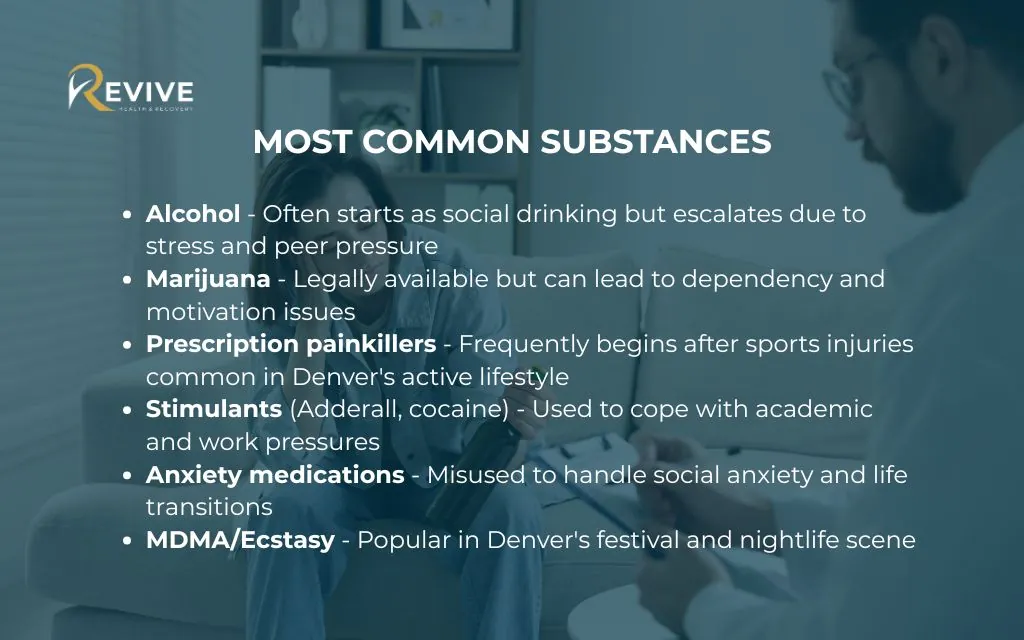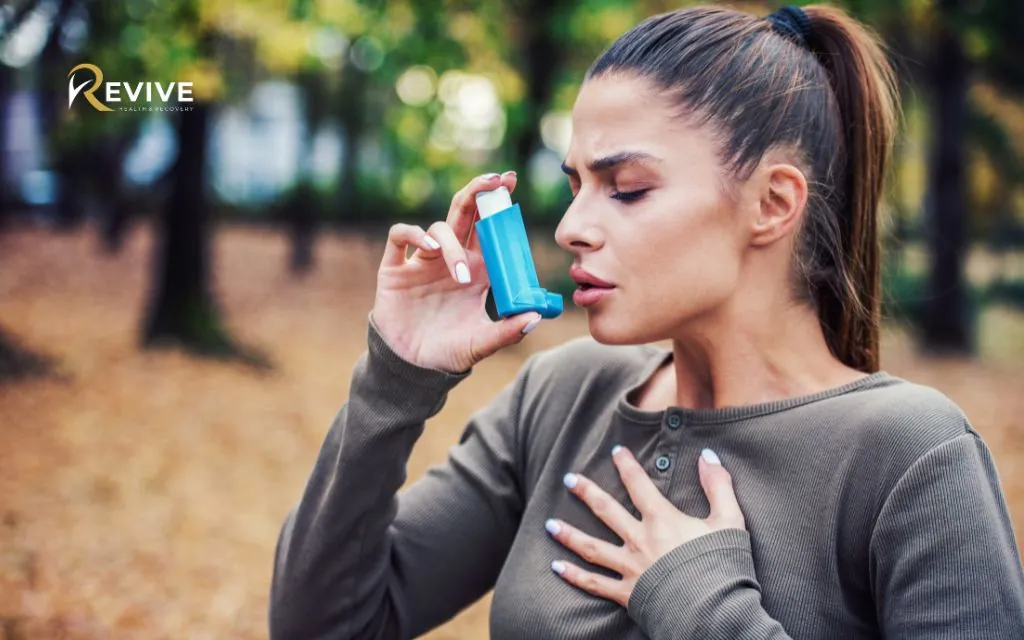Young adults in Denver face unique challenges when battling addiction, but recovery is possible with the right support. With over 22% of young adults in Colorado experiencing substance use disorders, finding specialized treatment that understands the developmental needs of 18-25 year-olds becomes essential. Denver offers innovative outpatient programs, dual diagnosis care, and evidence-based therapies designed for emerging adults.
Whether you’re struggling with alcohol, drugs, or co-occurring mental health conditions, comprehensive treatment options are available in the Mile High City. This guide explores the best addiction treatment resources and best addiction treatment for young adults Denver, helping you understand your options and take the first step toward lasting recovery.
Understanding addiction in young adults: Denver’s unique challenge
Statistics on young adult addiction in Colorado
The Reality in Numbers:
- 1 in 5 young adults (17-23%) in Colorado struggle with substance use disorders
- 416,000 people in Denver metro area use illicit drugs annually
- 63,200 Denver residents are dependent on drugs or alcohol
- Colorado ranks top 10 nationwide for young adult addiction rates
Why This Matters: Denver’s addiction rates exceed most major U.S. cities. Young adults need specialized treatment that understands their unique challenges during this critical life transition period.
Why young adults face higher risk in Denver
Unique Denver Challenges:
- High altitude effects – Affects how medications work in the body and brain
- Outdoor recreation culture – Higher rates of prescription painkiller abuse from sports injuries
- Legal marijuana – Creates complex addiction patterns and treatment needs
- Expensive living costs – Financial stress drives substance use as coping mechanism
- Party/festival culture – Normalizes drug use in social settings
The Perfect Storm: Young adults face academic pressure, career uncertainty, and social expectations while their brains are still developing. Denver’s unique environment amplifies these challenges, making professional treatment essential for recovery success.
Common substances of abuse among Denver young adults

Denver’s unique culture and lifestyle contribute to specific substance abuse patterns among young adults:
Most Common Substances:
- Alcohol – Often starts as social drinking but escalates due to stress and peer pressure
- Marijuana – Legally available but can lead to dependency and motivation issues
- Prescription painkillers – Frequently begins after sports injuries common in Denver’s active lifestyle
- Stimulants (Adderall, cocaine) – Used to cope with academic and work pressures
- Anxiety medications – Misused to handle social anxiety and life transitions
- MDMA/Ecstasy – Popular in Denver’s festival and nightlife scene
Why These Substances Appeal to Young Adults:
- Social acceptance masks serious addiction potential
- Easy availability through legal and illegal channels
- Stress relief from transitioning to independence
- Coping mechanism for Denver’s high cost of living pressures
Mental health treatment Denver often reveals co-occurring substance use, making dual diagnosis care essential for this population.
4 Types of addiction treatment available for young adults in Denver
Outpatient programs: Maintaining life while healing
- Best for: Young adults who need flexibility to continue work, school, or family responsibilities.
- What it includes: Weekly therapy sessions, group meetings, and medical monitoring without overnight stays. You attend treatment during the day and return home each evening.
- Why choose this: Perfect for motivated individuals with strong home support systems. Allows you to practice recovery skills in real-world situations while maintaining your daily routine.
- Treatment characteristics: Less intensive but requires strong personal commitment. Typically involves 1-3 sessions per week for 3-6 months.
Intensive outpatient programs (IOP)
- Best for: Young adults who need more support than standard outpatient care but can still live at home safely.
- What it includes: 3-5 sessions per week, each lasting 2-4 hours. Combines individual counseling, group therapy, family sessions, and life skills training.
- Why choose this: Ideal for those with moderate addiction severity or those stepping down from residential treatment. Provides structure while building independence.
- Treatment characteristics: More comprehensive than standard outpatient, meeting 9-15 hours per week. Duration typically ranges from 8-12 weeks.
- Our recommendation: Most young adults in Denver find IOP the perfect balance of support and flexibility for lasting recovery.
Dual diagnosis treatment for co-occurring disorders

- Best for: Young adults struggling with both addiction and mental health conditions like anxiety, depression, or trauma.
- What it includes: Integrated treatment addressing addiction and mental health simultaneously with specialized therapists trained in both areas.
- Why choose this: Essential when mental health symptoms contribute to substance use. Treating only addiction while ignoring depression or anxiety often leads to relapse.
- Treatment characteristics: Longer duration treatment (6-12 months) with coordinated care between addiction counselors and mental health professionals.
Individual vs. group therapy options
Individual therapy best for:
- Processing personal trauma or sensitive issues
- Developing personalized coping strategies
- Setting specific recovery goals
- Working through family conflicts
Group therapy best for:
- Building peer connections and reducing isolation
- Learning from others’ experiences
- Practicing social skills in recovery
- Long-term ongoing support
Our recommendation: Most successful young adults combine both approaches. Start with individual therapy to address personal issues, then add group therapy for peer support and community building.
Which program should you choose? Contact Revive Health Recovery at (303) 268-4655. Our assessment team will help determine the best fit based on your specific situation, addiction severity, and life circumstances.
Evidence-based treatment approaches for young adults
Cognitive behavioral therapy (CBT) for addiction
What CBT does: Helps young adults identify and change negative thought patterns that trigger substance use.
Perfect for young adults because:
- Provides immediate, practical tools you can use right away
- Teaches you to recognize warning signs before they become cravings
- Works with your developing brain to build healthy thinking patterns
- Skills transfer to school, work, and relationships
Real results: CBT participants show 60% higher success rates in maintaining sobriety compared to support groups alone.
Trauma-informed care and PTSD treatment
What trauma-informed care means: Treatment that recognizes how past trauma affects your addiction and creates a safe, non-judgmental healing environment.
Essential for young adults because:
- Many young adults carry childhood trauma, abuse, or assault experiences
- Trauma often drives substance use as a coping mechanism
- Traditional addiction treatment can accidentally re-traumatize without proper approach
- Addresses root causes, not just symptoms
Our approach: Every Revive Health Recovery staff member is trained in trauma-informed care to ensure your safety and healing.

Family therapy and support systems
Why family involvement matters:
- 85% higher success rates when families participate in treatment
- Repairs relationships damaged by addiction
- Teaches families how to support without enabling
- Reduces guilt and shame for everyone involved
What families learn:
- Addiction is a disease, not a choice or moral failing
- How to set healthy boundaries while showing love
- Communication skills that strengthen relationships
- Warning signs of relapse and how to respond
Peer support and recovery coaching
The power of peer support:
- Connect with others who truly understand your struggles
- See real examples that recovery is possible
- Learn practical strategies from people who’ve succeeded
- Build friendships that support sobriety long-term
Recovery coaching benefits:
- One-on-one support from someone with personal recovery experience
- Available during difficult moments outside of therapy hours
- Help navigating real-world recovery challenges
- Bridge between formal treatment and independent living
Ready to start your recovery?
Call Revive Health Recovery at (303) 268-4655 to learn which approaches work best for your situation.
Choosing the right treatment center in Denver
Questions to ask potential treatment providers
When evaluating substance abuse treatment Denver Colorado options, ask about staff qualifications and treatment approaches. Inquire about success rates, program length, and aftercare planning. Understanding the center’s philosophy and treatment methods helps you make informed decisions.
Ask about dual diagnosis capabilities, family involvement opportunities, and peer support availability. Learn about the facility’s approach to relapse prevention and crisis intervention. Quality treatment centers welcome questions and provide detailed information about their programs.
Key questions to ask treatment providers
About their expertise:
- Do you specialize in treating young adults (18-25)?
- What percentage of your clients are in my age group?
- Are your therapists trained in trauma-informed care?
- Do you treat dual diagnosis conditions?
About their approach:
- What evidence-based therapies do you use?
- How do you involve families in treatment?
- What’s your approach to relapse prevention?
- Do you offer continuing care after program completion?
About practical matters:
- What insurance plans do you accept?
- Can I verify my benefits before starting?
- What are your scheduling options?
- Do you offer telehealth or flexible hours?
Insurance coverage and costs
Good news:
Most insurance plans now cover addiction treatment for young adults Denver as essential health benefits under federal law.
What’s typically covered:
- Assessment and evaluation sessions
- Individual and group therapy
- Medical monitoring and medication management
- Family therapy sessions
- Intensive outpatient programs
Cost-saving options:
- Employee assistance programs through work
- Student health services at colleges
- Sliding scale payment programs
- State-funded treatment options
Don’t let cost stop you:
Call Revive Health Recovery at (303) 268-4655 for free insurance verification and to discuss all available payment options.
Location and accessibility factors
Consider these factors:
- Distance from home/work/school – Can you attend consistently?
- Public transportation access – Denver’s RTD system serves many treatment centers
- Parking availability – Important if you drive to sessions
- Multiple location options – Some centers offer flexibility
- Telehealth capabilities – Helpful for ongoing support
What accreditation means for you
Look for these quality markers:
- Joint Commission accreditation – Gold standard for healthcare quality
- CARF accreditation – Specialized for rehabilitation facilities
- State licensing – Required for legal operation in Colorado
- Insurance network participation – Shows quality standards
Why this matters: Accredited centers must meet strict standards for staff training, treatment protocols, and patient safety. Your recovery is too important to risk with unqualified providers.
The recovery journey: What to expect
Initial assessment and treatment planning
Your recovery journey begins with a comprehensive assessment examining your substance use history, mental health status, and personal circumstances. This evaluation helps create an individualized treatment plan addressing your specific needs and goals.
Assessment includes medical screening, psychological evaluation, and social history. The process identifies any co-occurring mental health conditions and determines the appropriate level of care. Your treatment team uses this information to develop a personalized recovery roadmap.
Building coping skills and relapse prevention
Recovery involves learning new ways to handle stress, emotions, and difficult situations without substances. Treatment teaches practical skills like mindfulness, communication, and problem-solving. These tools become essential for maintaining sobriety long-term.
Relapse prevention planning identifies your personal triggers and develops specific strategies for high-risk situations. You’ll learn to recognize early warning signs and implement coping strategies before reaching a crisis point. Practice makes these skills automatic over time.
Ongoing support and aftercare planning
Aftercare planning begins during treatment to ensure continued support after program completion. This might include ongoing therapy, support group participation, and regular check-ins with your treatment team. Strong aftercare significantly improves long-term recovery outcomes.
Support systems evolve as you progress in recovery. Initial intensive support gradually transitions to independence with available resources. Many programs offer alumni groups and ongoing services to support your continued growth and recovery.
Long-term recovery success strategies
Successful recovery requires ongoing commitment to personal growth and healthy lifestyle choices. Regular exercise, proper nutrition, and adequate sleep support both physical and mental health. Building meaningful relationships and pursuing personal interests strengthens your recovery foundation.
Career and educational goals provide positive focus and purpose. Many young adults use recovery as an opportunity to pursue delayed dreams or explore new interests. Setting and achieving goals builds confidence and reinforces your commitment to sobriety.
Denver-specific resources for young adults
Local support groups and community resources
Denver offers numerous support groups including Alcoholics Anonymous, Narcotics Anonymous, and specialized groups for young adults. SMART Recovery and Celebrate Recovery provide alternative approaches to traditional 12-step programs. Many groups meet virtually and in-person throughout the Denver area.
The Colorado Behavioral Health Administration provides resources and referrals for addiction treatment. Local libraries, community centers, and religious organizations often host support groups and educational programs. Online directories help locate meetings and resources specific to your needs.
Educational and vocational support during recovery
Denver Community College offers recovery-friendly educational programs and support services. The Colorado Department of Labor provides vocational rehabilitation services for people in recovery. These programs help young adults develop job skills and pursue educational goals while maintaining sobriety.
Career counseling services help identify strengths and interests while accommodating recovery needs. Some employers offer employee assistance programs that include addiction recovery support. Building a career foundation strengthens long-term recovery stability.
Housing and sober living options
Sober living homes provide structured, substance-free environments for young adults transitioning from treatment. These residences offer peer support, house rules, and accountability while allowing increased independence. Denver has several sober living options designed specifically for young adults.
Transitional housing programs help with employment, education, and independent living skills. Some programs offer scholarships or sliding scale rent options. Safe, stable housing removes barriers to recovery and provides a foundation for building a new life.
Transportation and accessibility services
Denver’s RTD public transportation system provides access to treatment centers throughout the metro area. Many addiction counseling Denver locations are accessible by bus or light rail. Transportation vouchers may be available through treatment programs or social services.
Rideshare programs and medical transportation services can help when public transit isn’t available. Some treatment centers offer transportation assistance or help coordinate carpools among participants. Reliable transportation removes barriers to consistent treatment attendance.
FAQs about best addiction treatment for young adults Denver
What makes addiction treatment different for young adults compared to other age groups?
Young adult addiction treatment addresses developmental needs specific to ages 18-25, including brain development, identity formation, and emerging independence. Treatment focuses on life skills, educational support, and career planning while addressing addiction. Programs consider the unique social pressures and transitions young adults face.
How much does addiction treatment cost in Denver, and what insurance plans are accepted?
Treatment costs vary based on program intensity and duration. Most insurance plans cover addiction treatment as essential health benefits. Revive Health Recovery accepts multiple insurance plans and provides verification services. Contact us at (303) 268-4655 for specific coverage information and payment options.
Can I continue working or going to school while in outpatient treatment?
Outpatient programs are designed to accommodate work and school schedules. Many young adults successfully maintain their responsibilities while receiving treatment. Programs offer flexible scheduling including evening and weekend options. Treatment teams work with you to balance recovery needs with other commitments.
What should I do if my young adult refuses treatment?
Family intervention services can help motivate treatment participation. Focus on expressing concern and offering support rather than ultimatums. Professional interventionists can guide difficult conversations. Sometimes court-ordered treatment or loss of financial support motivates participation.
How long does addiction treatment typically take for young adults?
Treatment duration varies based on individual needs and substance use severity. Outpatient programs typically last 12 weeks to one year. Recovery is a lifelong process requiring ongoing support and lifestyle changes. Many young adults benefit from extended aftercare and support services.
Why choose Revive Health Recovery for young adult treatment
Specialized expertise in dual diagnosis care
Revive Health Recovery provides comprehensive dual diagnosis with best addiction treatment for young adults Denver need for co-occurring mental health and addiction issues. Our team includes licensed therapists, certified addiction counselors, and medical professionals experienced in treating emerging adults.
We understand that young adults often struggle with depression, anxiety, trauma, and addiction simultaneously. Our integrated approach addresses all conditions together, preventing one from undermining the other’s progress. This comprehensive care approach leads to better long-term outcomes.
Evidence-based, trauma-informed treatment approaches
Our programs utilize evidence-based therapies including Cognitive Behavioral Therapy, Dialectical Behavior Therapy, and Trauma-Focused CBT. We recognize that many young adults have experienced trauma that contributes to their substance use patterns.
Our trauma-informed approach creates safety and builds trust while addressing underlying issues. Staff receive specialized training in working with young adults and understanding their unique developmental needs. Every aspect of treatment considers the potential impact of trauma.
Flexible outpatient programs that fit your life
We offer multiple program levels including standard outpatient care and intensive outpatient programs. Our scheduling accommodates work, school, and family responsibilities. We provide morning, afternoon, and evening options to fit your lifestyle.
Our programs adapt to your changing needs throughout recovery. You might start with intensive daily sessions and gradually reduce to weekly maintenance therapy. This flexibility helps you build independence while maintaining strong recovery support.
Compassionate, non-judgmental care environment
Recovery requires courage to face difficult emotions and experiences. Our team creates a safe, supportive environment where you can explore issues without fear of judgment. We treat addiction as a medical condition, not a moral failing.
Our staff includes people with personal recovery experience who understand your struggles. This combination of professional training and lived experience creates deep empathy and hope. You’ll feel understood and supported throughout your recovery journey.
Strong community partnerships and aftercare support
We maintain relationships with local employers, educational institutions, and sober living facilities to support your recovery goals. Our alumni network provides ongoing peer support and social connections. We offer continuing care services to support long-term recovery success.
Our family liaison works with your loved ones throughout treatment to strengthen your support system. We provide family education and therapy to repair relationships and build healthy communication patterns. Strong family support significantly improves recovery outcomes.
Take the first step toward recovery today
Young adults’ journey to recovery starts with a single phone call. At Revive Health Recovery, we understand the unique challenges young adults face with addiction and mental health issues. Our experienced team provides compassionate, evidence-based addiction treatment for young adults Denver that honors your individual needs and goals.
Recovery is possible, and you deserve a life filled with purpose and joy. Our best addiction treatment for young adults Denver programs have helped hundreds of young people reclaim their lives and build bright futures. You can be the next success story.
Contact Revive Health Recovery today:
Address: 1427 S Federal Blvd, Denver, CO 80219
Phone: (303) 268-4655 – Available 24/7
Email: contact@revivehealthrecovery.com
Don’t wait another day to begin your recovery journey. Our caring team is ready to answer your questions and help you take the first step toward healing. Recovery is possible, and we’re here to support you every step of the way.



